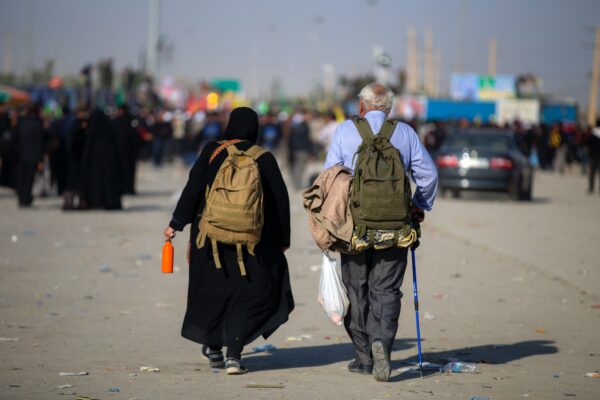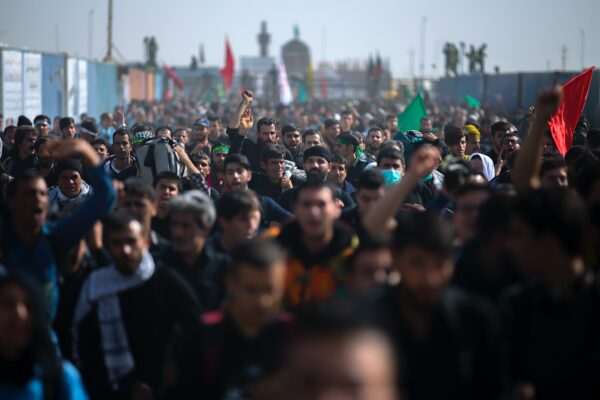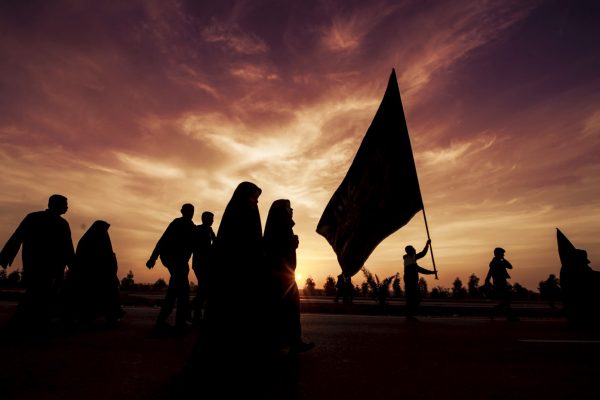Love for the family of the Holy Prophet (saw) is not at odds with Sunni Islam.
Love for the family of the Holy Prophet (saw) is not at odds with Sunni Islam.
I always knew when Muharram arrived. Haider, my best friend, would begin wearing black clothes…
As children, we never discussed Muharram. I understood it to be a sacred part of Shi’a practice, and honestly, I felt intimidated by it. In the days leading to Ashura, Haider’s demeanor would become tense, his tone would become serious, and his smile would become distant – it was clear he was mourning.
But, in 2015, things changed.
He made a pilgrimage of sorts to Karbala, the land on which Hussain ibn Ali (ra) was massacred. It was evident that Hussain (ra) played a significant role in Haider’s life, and upon his return, we discussed it.
I was surprised. Haider felt resentment towards me, believing that my community does not mourn the tragedy of Karbala. This, however, is not true. Hussain (ra) is my Imam too.
Setting the Record Straight: Love of Ahlul Bayt is Incumbent on Every Muslim
As Saudi Arabia and Iran embolden themselves in a wave of conflict that sweeps through the Middle East, the ripple of sectarianism is felt throughout the world — even, for example, within my friendship. Often, however, the differences between the sects have more to do with perception than with reality. One example relates to the love for the Ahlul Bayt, the family of the Holy Prophet (saw).
As the Shi’a community raise the banner of the Ahlul Bayt, expressing adoration for Ali (ra), Fatima (ra), Hassan (ra), and Hussain (ra), it is important they, the Shi’a community, realize: our appreciation for the Holy Prophet (saw) and his sunnah, dictates that we love the Ahlul Bayt too.
Hadith of Thaqalayn
During his final pilgrimage, the Holy Prophet (saw) stopped at a watering place known as Khumm and announced to the people that he would soon depart. In the tradition, narrated in Sahih Muslim, the Holy Prophet (saw) says that he is leaving behind two weighty things: the first of which is the Holy Qur’an, and the second of which are the members of his household, Ahlul Bayt.
A common discussion relates to who is considered a member of the Ahlul Bayt. Specifically, does this also refer to the wives of the Holy Prophet (saw) as well? As documented in Sahih Muslim and Riyadh as-Salihin, Zayd ibn Arqam, the narrator of the aforementioned tradition, clarifies by saying that the Ahlul Bayt that are specifically referred to in this tradition are limited to Ali ibn Abu Talib (ra) and his descendants, along with the brothers of Ali (ra) and their descendants.
Hadith of Safina
Love for the family of the Holy Prophet (saw) is not at odds with Sunni Islam. Imam Shafi’i describes his love for the Ahlul Bayt in his book of poetry, Diwan, “When religion splits into seventy groups as it has been made clear in the records, and only one group from among them will be saved, tell me with wisdom and rational, will the group to which belong the family of Muhammad (saw) perish or will it be the saved group?”
It is through this lens that Imam Shafi’i interprets that narration of the Holy Prophet (saw), documented in Mustadrak by al-Hakim Nisaburi, “My Ahlul-Bayt are like the Ark of Noah. Whoever embarked in it is saved, and whoever turns away from it will perish.”
It is said that the best of lies are those that begin with elements of truth. And with regards to Haider’s assumption that only the Shi’a love the Ahlul Bayt, this is the case. It is true that diversity of opinion exists in regards to adoration of the Ahlul Bayt. For example, with respect to the above referenced hadith about the Ahlul Bayt serving as an ark of salvation, Ibn Taymiyyah does not accept it as authentic. Further, pulpits across North America are often silent about the story of Karbala.
I must admit: if not for my friend, I may have never heard about the plight of Hussain (ra). This, of course, represents a significant incongruence between belief and practice. If I am to love the Ahlul Bayt, at a minimum, I must know about them.
A Synopsis of Karbala According to the Sunni Tradition
Be forewarned, the tragedy of Karbala is not for the faint-hearted. Imam Hussain (ra), his family, and companions were butchered at the hands of the Muslim ummah. The Leicester Central Mosque has produced a chronological account of the martyrdom of Imam Hussain (ra) based on reliable sources, and I have included excerpts from it below.
Why did the Battle of Karbala occur?
Before Mu’awiya died, he appointed his son Yazid became the Leader of the Muslims. For many Muslims, the succession poised a serious problem. Yazid was not known as a morally-upright, pious Muslim. According to the history of al-Tabari, Yazid is described as “…a man who has no religion, who drinks wine, who plays lutes, who passes his time with songstresses, who plays with dogs and spends his evenings talking to robbers and young men.”
Yazid understood that he could never be rightfully seen as the Leader of the Muslims without the backing of Imam Hussain (ra), but Imam Hussain – along with Abdullah ibn al-Zubair – showed no signs of accepting him as leader.
During this same period, the Muslims of Iraq – particularly Kufa – learned that Imam Hussain (ra) had refused to accept Yazid as Leader, and thus invited Imam Hussain (ra) to lead them. Thereafter, Imam Hussain (ra) began a journey with his family and companions to Kufa. However, after Yazid learned of this, he installed a new governor in Kufa, Ubaidallah ibn Ziyad. Due to incitement, bribery and brute force of Ibn Ziyad, the situation in Kufa took a turn for the worse, as the people of Kufa deserted Imam Hussain (ra) and switched their allegiance to Yazid.
By the time Imam Hussain (ra) reached the outskirts of Kufa, it was already too late.
What happened on the day of Ashura?
The forces of ibn Ziyad denied entry into Kufa for the caravan of Imam Hussain (ra). On the 2nd of Muharram, 61 A.H. Imam Hussain (ra) set-up camp in the desert of Karbala. In the days that followed, ibn Ziyad, under the direction of Yazid ibn Mu’awiya, surrounded the camp of Imam Hussain (ra) with an army of at-least 20,000 soldiers according to al-Sayuti.
From the seventh to the tenth of Muharram, the respected members of the beloved Prophet’s family were put under each and every kind of trial and affliction. They were without food and water, in the unbearable open fields of Karbala. They were scorched by hot blasts of winds. Despite the unfavourable situation, Imam Hussain remained resolute and firm in his belief. He refused to accept defeat at the hands of the tyrannical and cruel ones.
After the forces of Ibn Ziyad began the battle on the 10th of Muharram, Ashura, Imam Hussain (ra) reminds the enemy army of the crime that they were about to commit. According to Ibn Kathir, Imam Hussain (ra) says
‘… Am I not the son of the daughter of your Prophet, the son of the executor of his will and his cousin, the first of the believers in God and the man who [first] believed in what His Messenger brought from his Lord? Was not Hamzah, the lord of the Martyrs, my uncle? Was not Ja’far, who flies with two wings in heaven, my uncle? Have you not heard the words that circulate among you that the Prophet of Allah said concerning myself and my brother: ‘These are the two leaders of the youths of the inhabitants of heaven’?
Though they were only thirty-two horsemen, Imam Hussain’s followers put a brave and courageous fight. By midday, most of Imam Hussain’s faithful devotees had been martyred. Soon after, none remained except the close relatives of Imam Hussain. One by one, they too were brutally assassinated. Imam Hussain’s own son, Ali Akbar, was savaged to pieces by the cruel army. Qasim, the son of Imam Hasan, showed great courage and bravery, but was soon martyred too. Even his infant child Ali Asghar was not spared.
The Martyrdom of Imam Hussain (ra)
Imam Hussain (ra) was left with no associate. Dead bodies of his family, friends and relatives lay outside his tent. Already suffering from heavy shock, physical weakness and loneliness, the prince of the Prophet’s family was now prepared for his historical and unforgettable martyrdom… He embraced his son Zain al-Abidin, gave some instructions to his wife, awarded the last consolation to his sister Zainab, and kissed his seven year old daughter Sakina. Before departing for the battlefield, he looked at everybody for the last time with painful and wet eyes.
Tirmidhi reports that on the 10th of Muharram, 61 A.H., on the day which Imam Hussain (ra) was murdered, Um Salma, the wife of the Holy Prophet (saw), who was in Madina at the time, cried. When asked why, Um Salma replies, “I just saw the Prophet in my dream, and his head and beard were covered in mud. I asked him ‘what is wrong?’ He replied, ‘I witnessed the killing of Hussain.”
After Imam Hussain (ra) was killed, the forces of Ibn Ziyad decapitated his body and used horses to trample his body. According to Tabari, when the head of Imam Hussain (ra) was presented to Yazid ibn Mu’awiya, he began to poke the head with his cane.
Bridging a Divide through Imam Hussain (ra)
Only 50 years after the death of the Holy Prophet (saw), his ummah tore apart the beloved Ahlul Bayt. Among the most striking reflections from the martyrdom of Imam Hussain (ra) is that he was killed at the hands of other Muslims. In fact, the overwhelming majority of the Muslims on the battlefield of Karbala on that day were in the wrong.
Today, 1,400 years after the death of the Holy Prophet (saw), I look inward. Among the deeply divided ummah of the Holy Prophet (SAW), am I among those that would be on the right side of history?
This year, I joined Haider. I too am wearing black. Because in the commemoration of Imam Hussain (ra), the grandson of the Holy Prophet (saw), there is no Shi’a or Sunni; rather, there are only those Muslims that are with Imam Hussain (ra) and those that are against him.
by Abu Yusra al-Katib
Also check out…





